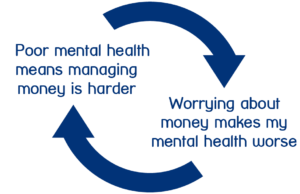Today in Canada, we recognize Bell Let’s Talk Day. This is a day where a hashtag can raise money for mental health programs across Canada, with the encouragement to talk about mental health in an effort to end the stigma.
So let’s talk about mental health. It’s my belief that you shouldn’t reserve one or two days of the year to talk about mental health, but rather it should be a conversation happening daily. People who struggle with mental health don’t have only one or two days a year of struggle – it can be daily.
Mental health struggles can often be exacerbated by financial stress.
In fact, according to Stats Canada survey in 2019, approximately 48% of Canadians say they’ve lost sleep because of financial worries, and 40% of Canadians (Ipsos, 2018) agree that their level of debt is negatively affecting their mental health.
Living through a pandemic is only adding to the stress, isolation, and negativity that so many of us are feeling. You can get through that by taking on a plan to move away from your financial stress. It can be as simple as creating and exacting a budget to get a handle on your cashflow management.
But if you’re looking for more financial security, a plan can provide peace of mind, information to hedge any anxiety you may be feeling about your financial security, and the confidence and assistance of a professional so you’re not alone.
Moving your finances in a better direction isn’t the only aspect of financial security we can strive for to ease our minds. Protecting ourselves in the event of mental health concerns becomes a foundation to a financial plan.

According to that same 2019 Statistics Canada report, 44% of Canadians say it would be difficult for them to meet their financial obligations if their pay is late. That statistic is not only concerning since it reveals that a large percentage of Canadians are living paycheque to paycheque, but also because that is a lot of stress for an individual to manage.
Employee? Self-Employed? What help is available…
If you’re an employee and have a group benefits plan, you likely have access to coverage for counseling and can take sick leave for mental health concerns with compensation through employment insurance. What if you’re not an employee, but rather are self-employed and have potential for even more stress in your life? For those self-employed, you want to protect your income for your household AND the continuation of your business.
Likely if you’re working through a mental health concern for a few months, you’re not going to close your business and lose all that momentum. You may press pause if that’s possible, but ask yourself, how would that impact your household’s financial position? This is where insurance can become an economical solution for not just income protection, but peace of mind that you CAN take time off long-term to heal from a broken leg or mental health concern and receive an income supplement.
Every year, 4000 people die from suicide in Canada.
The impact on their loved ones is palpable, and having additional financial stress doesn’t help. Many people are surprised that a life insurance policy will pay out for a death by suicide. There is a 2-year clause on a new policy – meaning that the company will not pay the benefit if the insured dies by suicide in the first 2 years of the policy – but after that clause has been fulfilled a full benefit is available to the designated beneficiary. Whether or not you struggle with mental health issues today, ensuring that you have an adequate life insurance program can help your future self and peace of mind of not only you but your loved ones. After all, life insurance isn’t for you, it’s for those you love.
If you’re experiencing mental health challenges and need to talk, help IS available. Call:
9-1-1
In Niagara
CMHA Niagara: https://niagara.cmha.ca
Call COAST 24/7: 1-866-550-5205
Pathstone Mental Health: https://pathstonementalhealth.ca
Crisis Line: 1-800-263-4944
Across Canada
Kids Help Phone: 1-800-668-6868
Text CONNECT to 686868
Chat Services [6 pm–2 am EST]: www.kidshelpphone.ca
Trans Lifeline: 1-877-330-6366
Hope for Wellness Help Line: 1-855-242-3310
Online chat: www.hopeforwellness.ca
Indian Residential Schools Crisis Line: 1-866-925-4419
Canada Suicide Prevention Service: 1-833-456-4566 [24/7]
For Quebec residents: [24/7] 1-866-APPELLE
